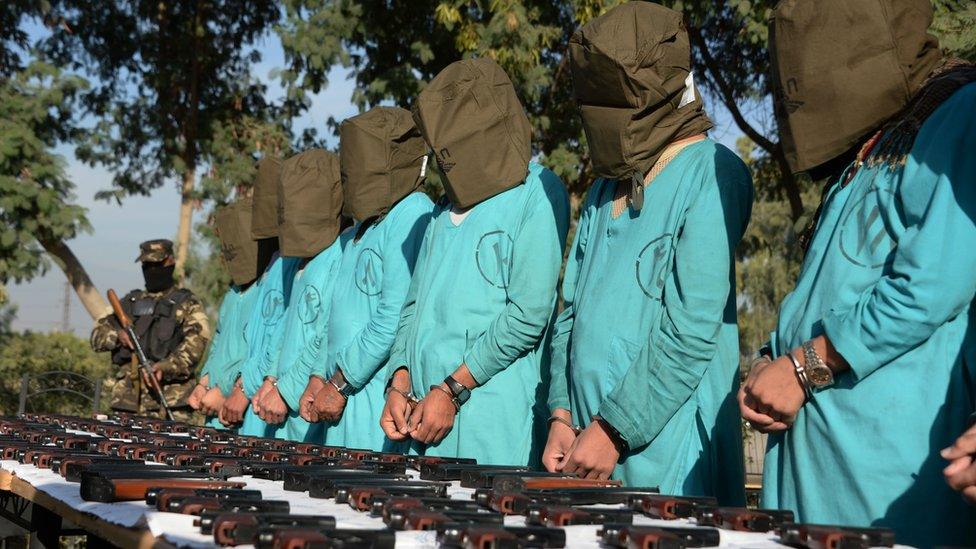Kabul bomb: Afghan leader condemns 'cowardly' attack
- Published
A huge crater formed outside the German embassy in Kabul
President Ashraf Ghani of Afghanistan has condemned a massive bomb attack in the capital Kabul, which killed at least 90 people, as "cowardly".
A suicide attacker detonated a bomb hidden inside a tanker truck close to the heavily protected diplomatic area during the morning rush hour.
Some 400 people were injured by the blast, which left a deep crater.
No group has said it carried out the attack but Taliban militants denied being involved.
Recent bomb attacks in Kabul have been claimed either by the Taliban or so-called Islamic State (IS).
Most of the casualties were Afghans but foreign nationals were also injured, including 11 US citizens. The bomb exploded close to the German embassy, where a number of staff were injured.
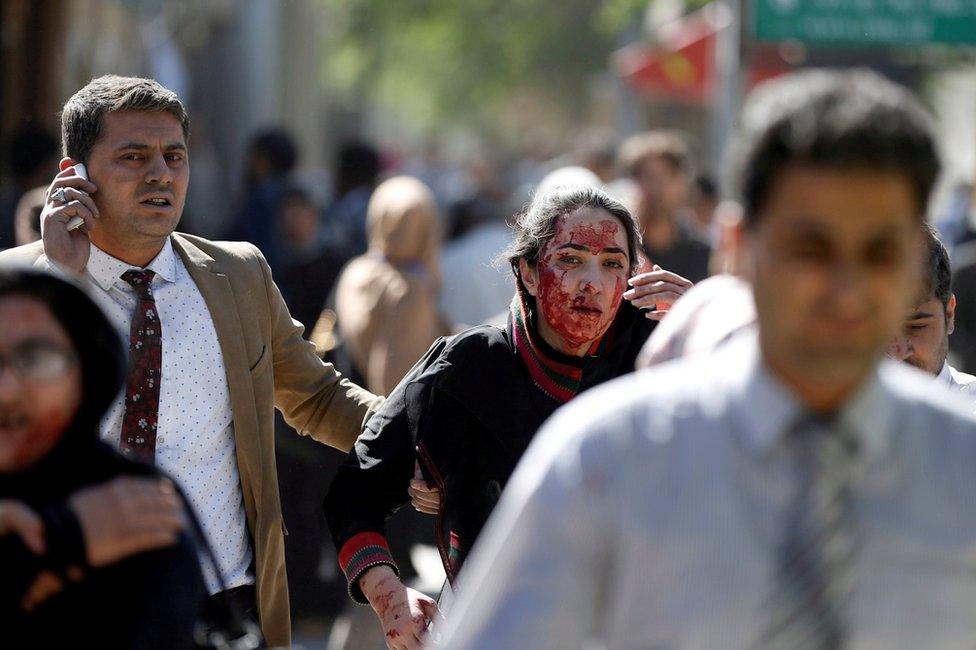
Injured Afghans, some with blood on their faces, fled from the scene on Wednesday
Authorities in Germany postponed a deportation flight due to return failed Afghan asylum seekers, with a government source telling AFP news agency that diplomatic and consular staff had "more important things to do than to deal with organisational matters" so soon after the attack.
When and where did the attack take place?
The bomb went off at about 08:20 local time (03:50 GMT) near Zanbaq Square, outside the Green Zone.

Reports vary as to the kind of vehicle used to deliver the bomb - either a water or sewage tanker.
One Western diplomatic source told AFP news agency the blast had been caused by more than 1,500kg (3,307lb) of explosives.
The area is home to key buildings including embassies and the presidential palace.
More than 50 other vehicles were destroyed.
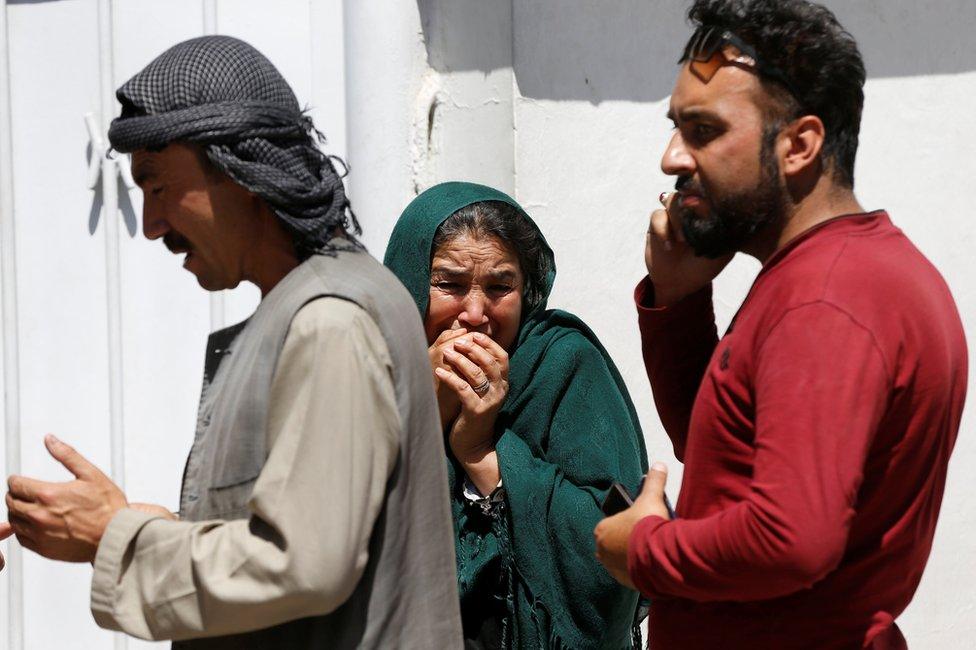
Local hospitals treated the casualties as people waited outside for news of loved ones
Who were the casualties?
Many of the casualties appear to have been Afghan civilians on their way to work or school, and office workers in nearby buildings.
"I have never seen such a terrible explosion in my life," local shop owner Sayed Rahman told Reuters news agency after his store was badly damaged.
Another resident, Abdul Wahid, told the BBC the blast had been "like a heavy earthquake".
BBC's Tajuden Soroush was a passenger in the car with Mohammed Nasir when bomb exploded
Those injured or killed in the attack included:
Mohammed Nazir, a driver for BBC Afghan for more than four years, who died in the blast. Four other BBC employees were injured.
11 US citizens working as contractors at the American embassy were also injured.
Employees at the German embassy were injured and one Afghan security guard had died.
Aziz Navin, a staff member of Afghanistan's Tolo news agency, was killed.
A Tolo journalist also said some of the victims were from the Roshan mobile phone company, but this has not been confirmed.
Two Japanese embassy staff members were slightly wounded.
Several countries including France and Turkey also reported damage to their embassy buildings.

Mohammed Nazir
The BBC has been reacting to the death of its Kabul driver:
Francesca Unsworth, BBC World Service director: It is with great sadness that the BBC can confirm the death of BBC Afghan driver Mohammed Nazir following the vehicle bomb in Kabul earlier today, as he was driving journalist colleagues to the office. Mohammed Nazir worked as a driver for the BBC Afghan service for more than four years and was a popular colleague. He was in his late 30s and he leaves a young family. This is a devastating loss to the BBC and to Mohammed Nazir's friends and family.
Tony Hall, BBC director-general: Many of our staff face dangerous situations every day as they report from volatile areas around the world. It's testament to their bravery that we are able to provide trusted, impartial coverage - but consequences like this are devastating for us all. Our thoughts and prayers are with Mohammed's family and many friends at such a very sad time.
Waheed Massoud, BBC Afghan service: Mohammed Nazir was young. He was the father of four children and the only breadwinner in his family. He had a gentle smile and a warm personality. I knew Nazir for years and I worked with him most days of the week. BBC journalists, support staff and visitors remember him as an honest and reliable person. Most colleagues deploying from Kabul to dangerous provinces would prefer to go with Nazir.
Read Waheed's tribute in full.

Has Germany stopped deportations indefinitely?
It appears not. AFP's source at the interior ministry said there would be no flights for a few days - but they would resume.
Germany argues Afghanistan is a safe country for failed asylum seekers to return to - unlike Syria, for example.
Chancellor Angela Merkel has condemned Wednesday's bombing, saying "terrorism has no borders".
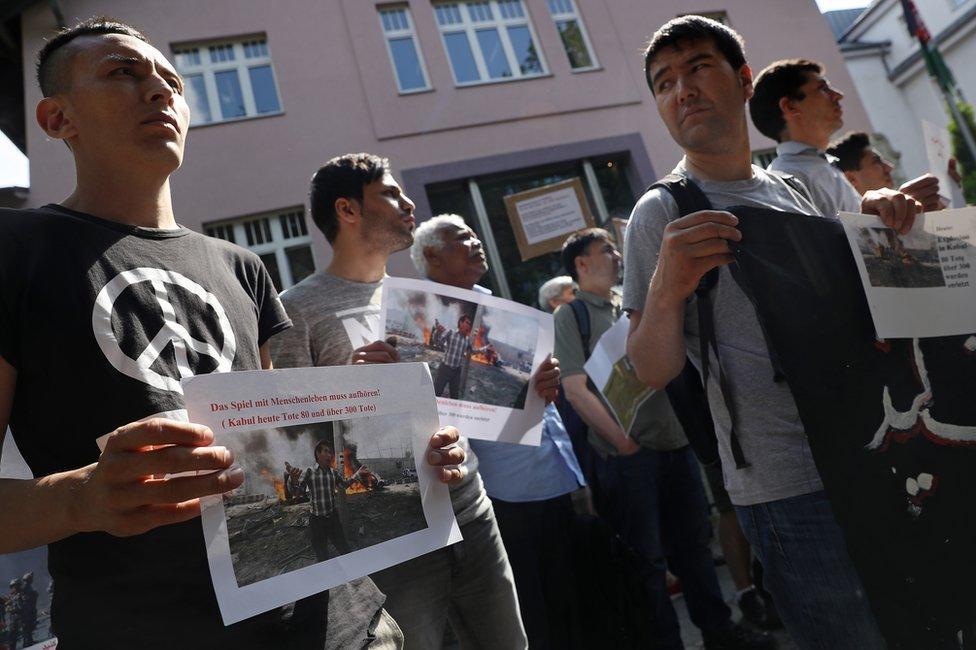
Afghans in Berlin protested against deportations outside the Afghan embassy on Wednesday
US President Donald Trump has "condemned the attack, which occurred during the holy month of Ramadan, underscoring the barbaric nature of the terrorists who are enemies of all civilised peoples", the White House said.
Others including India, Pakistan and Pope Francis have also condemned the attack, with UN Secretary General Antonio Guterres expressing "abhorrence" at the bombing.
Who could have been behind the attack?
The Taliban has denied responsibility, but Afghan government spokesman Sadiq Sadiqi said it was "very typical" of them to do so in situations with many civilian casualties.
"Their denial will make no sense because it's very clear for people who is behind these kinds of attacks," he said.
The Taliban said it would focus on foreign forces when announcing the start of their major spring offensive last month, and recently attacked an Afghan army training compound in the northern city of Mazar-e Sharif.
The IS claimed responsibility for a suicide bomb attack this month on a Nato convoy passing the US embassy in Kabul. At least eight civilians were killed.
It has made no comment so far on the latest attack.
The US has about 8,400 troops in Afghanistan, with another 5,000 from Nato allies.
The Pentagon has reportedly pressed President Donald Trump to send thousands more troops back to the country to try to counter gains by the Taliban. More than a third of Afghanistan is now said to be outside Afghan government control.
- Published12 January 2017
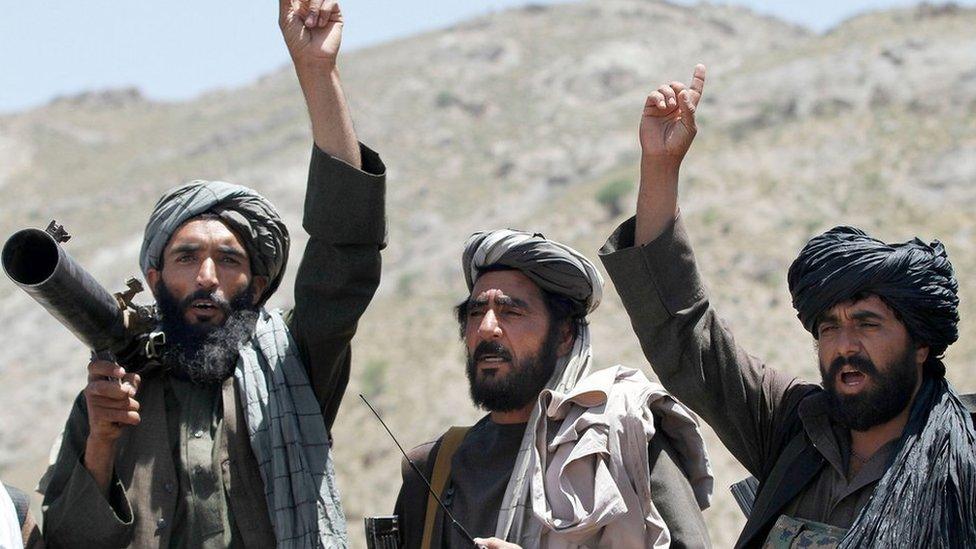
- Published25 February 2017
